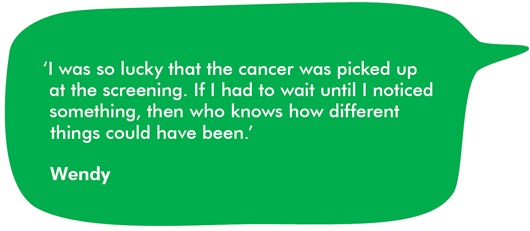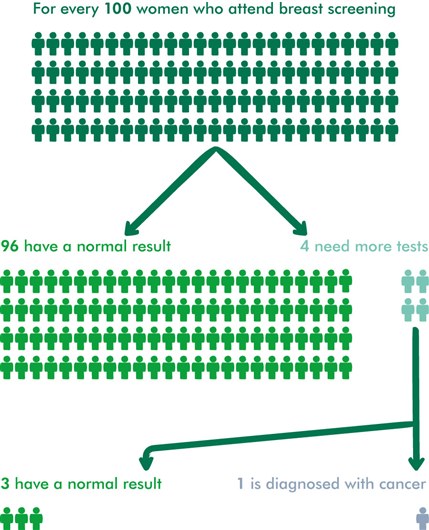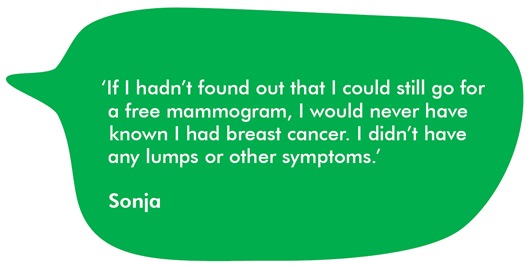
In this blog, written by our editor Sofiane, we will tell you 10 things you should know about breast screening.
Breast screening can help find breast cancer at a very early stage, so that women have the best chance of being cured. In the UK, all women who are aged 50 to 70 and registered with a GP (family doctor) are invited by letter to have breast screening every three years.
1. Breast screening saves lives
Research shows that breast cancer screening programmes probably prevent around 1,300 women in the UK dying from breast cancer every year. Most cancers found through breast screening are at an early stage, when there is a good chance of treatment being more successful.

2. Most women receive a normal screening result
About 96 out of every 100 women (96%) who go for screening will have a normal result. Some women are invited to a breast assessment clinic for further tests. This happens in about 4 in 100 (4%) of women who go for screening. Around 3 out of 4 (75%) of women who have further tests will not have breast cancer.

Results of breast screening
3. Having a mammogram involves x-rays
A mammogram is a breast x-ray. You have a mammogram of each breast, one at a time.
All x-rays, including mammograms, involve a small amount of radiation. However, the amount given during a mammogram is very small.
4. Mammograms can be uncomfortable
Many women find having a mammogram uncomfortable or even painful, but usually only
for a short time. Some women may feel tender in the area for a few days afterwards.
Mild painkillers can help with this. Your doctor or nurse at the breast screening clinic can suggest what to take.
5. Mammograms may need to be repeated
Occasionally you might be asked to have another mammogram. This is because:
6. Cancer may develop between screenings
Women having screening can still be diagnosed with breast cancer between their appointments, even if their last mammogram was normal. This is known as an interval cancer. If you notice any changes in the way your breasts look or feel, make an appointment to see your GP straight away.
7. Screening may find a cancer that would never have needed treatment
Some breast cancers that are diagnosed through breast screening may not grow any bigger. Or they may grow so slowly that they would never have caused a problem during a woman’s life. It is not possible to tell which breast cancers do not need treatment, so all women who are diagnosed will be offered treatment.
8. If you are under 50 or over 70, you can still go to screening appointments
Women under 50 are not routinely offered breast screening. This is because breast cancer is less common in women under the age of 50. Talk to your GP if you have symptoms that could be breast cancer, or if you are worried about your risk of developing breast cancer because of a family history.
If you are over the age of 70, you can still have screening because you are still at risk of breast cancer. You won’t receive an invitation letter, but you can contact your local screening clinic every three years to arrange a mammogram. If you notice a change in the way your breast looks or feels at any time, make an appointment to see your GP as soon as possible.
Find out where your local screening clinic is by asking your GP or searching on the NHS website.

9. If you are a trans person, you may need to go to screening appointments
If you are a trans person, you can ask your GP about whether you should go to screening. The LGBT Foundation has a helpline (0345 3 30 30 30) that can give you confidential advice and support. You can also talk to one of our cancer support specialists on 0808 808 00 00.
10. Breast screening does not prevent cancer
Screening only helps to find a breast cancer that is already there. You should always see your GP if you have any changes in your breasts, even if you have recently had a normal mammogram result.
More information and support
We have a booklet called Understanding breast screening. It has more information about breast screening, how to arrange an appointment and what happens when you receive your results. This booklet is available in print, PDF and eBook formats.
We also have a leaflet called Are you worried about breast cancer? It talks about how your genes and family history can affect your risk of developing breast cancer.
Our information about breast screening is also available on our website.
If you would rather talk to someone, our cancer support specialists can help – you can speak to them by calling 0808 808 00 00.
To see what else Macmillan's cancer information team has been blogging about, please visit our blog home page! You can subscribe to receive our blogs by email or RSS too.
We're with you every step of the way
The Macmillan team is here to help. Our cancer support specialists can answer your questions, offer support, or simply listen if you need a chat. Call us free on 0808 808 00 00.
Comments? Feel free to add them below (you need to be logged in).
Keep in touch Follow Macmillan’s cancer information team on Twitter @mac_cancerinfo
Whatever cancer throws your way, we’re right there with you.
We’re here to provide physical, financial and emotional support.
© Macmillan Cancer Support 2024 © Macmillan Cancer Support, registered charity in England and Wales (261017), Scotland (SC039907) and the Isle of Man (604). Also operating in Northern Ireland. A company limited by guarantee, registered in England and Wales company number 2400969. Isle of Man company number 4694F. Registered office: 3rd Floor, Bronze Building, The Forge, 105 Sumner Street, London, SE1 9HZ. VAT no: 668265007